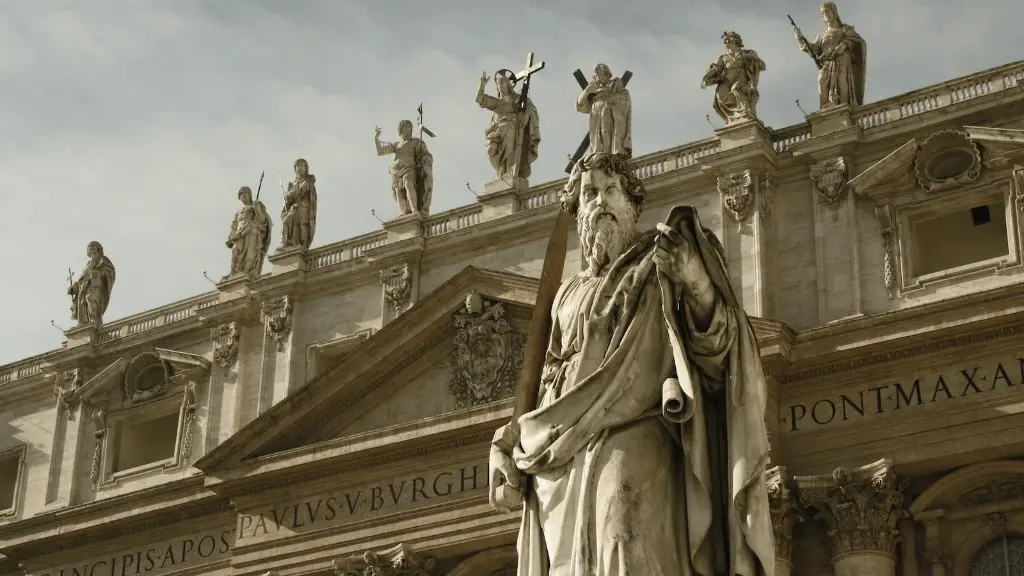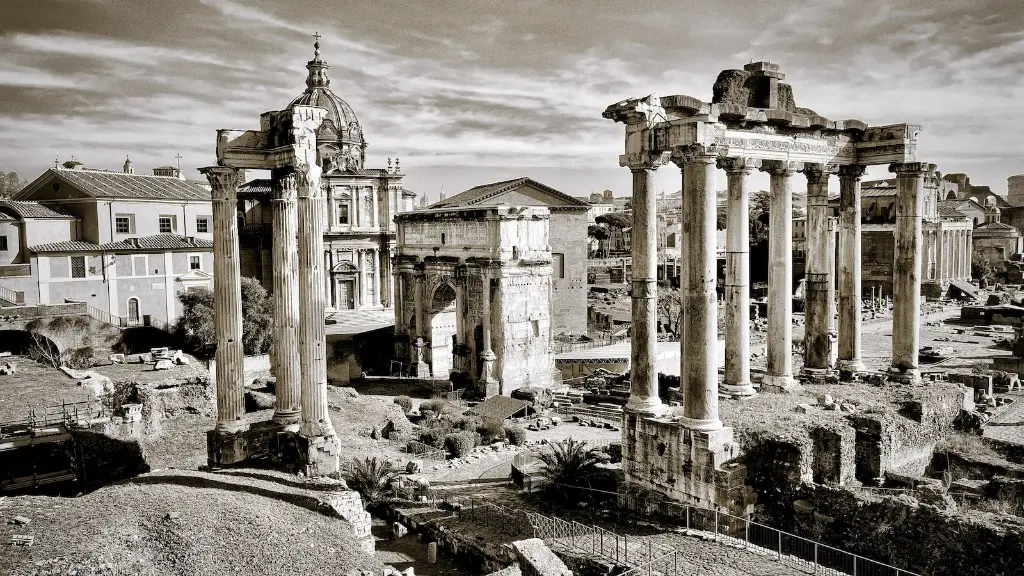Religions of Ancient Rome included polytheistic beliefs which incorporated a range of gods and goddesses. Religious practices evolved over time and included many customs, spiritual beliefs and rituals. The ancient Romans believed in deities that governed different aspects of their lives, from health, fertility, war and the underworld. Gods were celebrated in different festivals and much of everyday life was centred around their worship. This article will explore the religions of Ancient Rome and provide an insight into the diverse beliefs and customs of this ancient civilization.
The Roman pantheon contained a range of gods and goddesses, with each one featuring a different role or attribute. For example, Jupiter was the god of sky and thunder, Mars was the god of war, and Apollo was the god of music and healing. Worship was central to the Romans, and they celebrated a significant number of festivals in honour of the gods. During these festivities, offerings of food, wine and incense were made and games were played. Many of these practices evolved over the centuries and even today, some of these festivals are still celebrated in towns across Italy.
The religion of Ancient Rome was not just limited to the gods. The Romans also believed in the power of rituals and superstitions. Magical ceremonies and protective charms were used to ensure good luck and protect against evil forces. Humankind was also believed to possess familial and social obligations to their gods and deities, which were expressed through sacrifices and offerings. Animal sacrifice was a common practice, and was often performed at temples or in private homes. It is important to note however, that these beliefs and practices changed over time, as cultures and religions influenced each other in the ancient world.
The beliefs of the Ancient Romans served to provide comfort, support and structure in everyday life. It is believed that the ideology of a single, powerful and omniscient god, which is seen in some religions today, emerged from Ancient Rome. While the gods were praised, honoured and worshipped, they were also feared and placated. Religion provided an important means of structuring daily life in Ancient Rome, and shaped the cultures of those who called it home.
Religion was just one of the many aspects of Ancient Roman life. Religion was tied to different activities such as warfare, politics, business and daily life. Moreover, religion impacted other aspects of life such as art, literature and architecture. These influences can be seen in a variety of ways, such as the use of religious symbols in paintings and sculptures, classical references to the gods in literature, and architectural monuments built in honour of deities.
The religions of Ancient Rome had a profound impact on society. They provided a structure for social and political behaviour, as well as the basis for religious and ethical practices. Even in modern day, many of the rituals, customs and beliefs of Ancient Rome have remained influential to cultures around the world.
Impact of Politics on Religion
The religion of Ancient Rome was strongly connected to politics, and the powers of the gods were respected by the citizens of the empire. Religion was used as a way to unite people and to promote stability. Different leaders in Rome adopted religious policies either to strengthen the reverence of their rule or to honour the gods. Oftentimes, the most powerful gods were given the greatest respect and devotion by Roman patriots.
Different emperors used religious beliefs and rituals to demonstrate their strength and power over their people. For example, Emperor Augustus was deified by his people and worshipped as a god. He used this power to shape the traditions and doctrines of Rome, as well as to influence the religious practices of the people. Many of these practices still exist today, such as the celebration of the Saturnalia, which was initially initiated by the Emperor.
The Romans also adopted the belief of polytheism, which allowed them to have many gods and goddesses with distinct powers. This polytheistic belief allowed the people of Rome to identify with several gods and adapt their beliefs to those of the ruler’s. By doing so, they were able to ensure the favour of their ruler and maintain the stability of their society.
In addition to its influence in politics, religion was also used to lay foundations for law. Laws were based on religious values and moral principles, which ensured that social justice was maintained. Furthermore, religious law helped to solidify the status of the upper class and protect them from any threat or attack from the lower classes.
Absorption of Foreign Religions
The religion of Ancient Rome was not limited to its own systems and beliefs. The Romans absorbed the religious beliefs and rituals of millions of people from neighbouring civilizations. This was mainly done through cultural assimilation and the adoption of political policies. For example, the Emperor Constantine adopted the Christian religion, which is now one of the largest religions in the world.
The influence of foreign religions on the culture of Ancient Rome was significant and helped to shape the religious beliefs and customs of the people. Roman gods were sometimes associated with foreign gods, such as the Celtic god Mercury becoming associated with the Roman god Mercury, or the Egyptian goddess Isis becoming associated with the Roman goddess Juno. This adoption allowed the beliefs of one culture to influence and be shared with another culture, and helped to spread religious values and practices around the world.
The Romans were also exposed to other foreign religions, such as stoicism and Epicureanism. These were philosophical schools of thought, with stoicism emphasising the importance of rationality, self-control and acceptance of fate, and Epicureanism advocating for a life of pleasure and avoiding of pain. The adoption of these ideas impacted the religious belief systems of Ancient Rome as well as contributing to moral and philosophical thought.
Development of Christian Religion
Christianity evolved in Ancient Rome and, although it was initially persecuted, it was eventually embraced as the official religion of the empire. This was mainly due to the Emperor Constantine, who believed that Christianity could be used to help strengthen and unify the Roman Empire. Christianity helped to further shape the beliefs and customs of the Ancient Romans, as well as providing an outlet for religious devotion. Christianity also provided spiritual guidance in a period of instability, and made religious guidelines and beliefs more accessible to the people.
The Christian religion was influential not only in Ancient Rome, but around the world. Over time, Christian values would become increasingly accepted and the religion would spread to many different countries. Furthermore, Christianity would become the basis for the development of other religious beliefs, such as Islam and Buddhism. The influence of Christianity in Ancient Rome ultimately made it one of the most influential religions in history.
Influence of Greek Religion
The religion of Ancient Greece had a strong influence on the religion of Ancient Rome. The Greeks believed in many gods and goddesses, each with a different role or attribute, which provided the foundation for the Roman pantheon. The Greeks also believed in the power of rituals and magical ceremonies, which were adopted by the Romans. Moreover, the architecture and art of the Ancient Greeks would become an important part of religious worship in Ancient Rome.
The religion of Ancient Greece also impacted the belief system of Ancient Rome. For example, Greek gods were often associated with Roman gods, such as Apollo being associated with the Roman god Jupiter. Furthermore, the ancient Greeks introduced philosophical ideas such as stoicism and Epicureanism, which were adopted by the Romans and incorporated into their belief systems.
The religion of Ancient Greece ultimately had a major influence on the religion of Ancient Rome. The practices, beliefs and customs of one civilization was able to influence and shape the beliefs of the other, which helped to form the foundation of many of the religious beliefs and practices seen today.
Evolution of Beliefs
The religion of Ancient Rome was extremely varied and diverse, incorporating beliefs from different cultures and civilizations, as well as adapting over time in response to political, cultural and social changes. This variability of beliefs allowed for the evolution of religious thought and practices, as well as for new beliefs to be formed and shared. This process of continual change and evolution has been seen throughout history, and has helped to shape many of the religious beliefs and practices seen today.
In Ancient Rome, many of the religions that were established have survived in some form or another. For example, Christianity is still one of the major religions practiced around the world, and many of the rituals and spiritual beliefs that were practiced in Ancient Rome can be seen in other cultures today. Additionally, many of the gods and goddesses of Ancient Rome, such as Jupiter and Mars, are still remembered and celebrated in modern-day Italy.
The religions of Ancient Rome have had a lasting impact on the world. They provided a foundation for religious and philosophical thought and influenced many of the religions practiced today. The adaptable, diverse and ever-evolving beliefs of Ancient Rome have left a powerful legacy in the world and continue to shape the spiritual and ethical values of the modern day.





